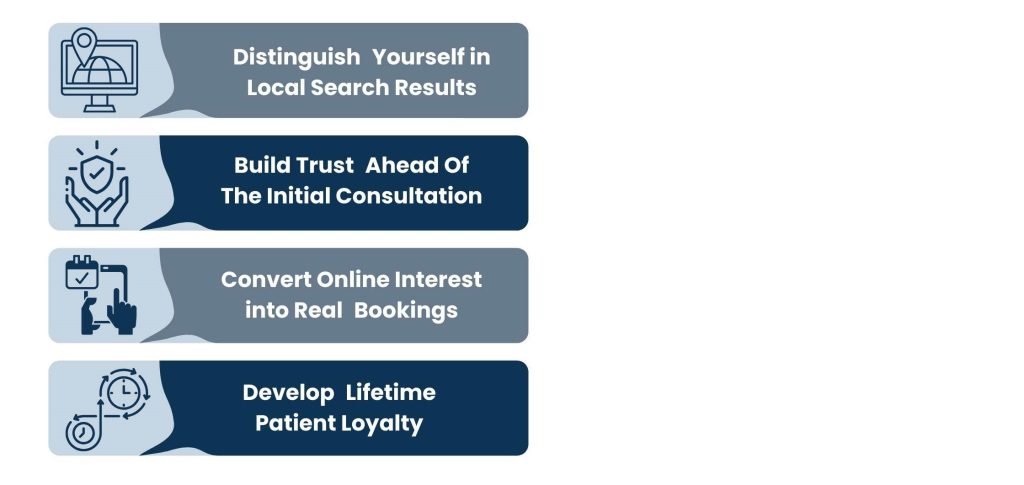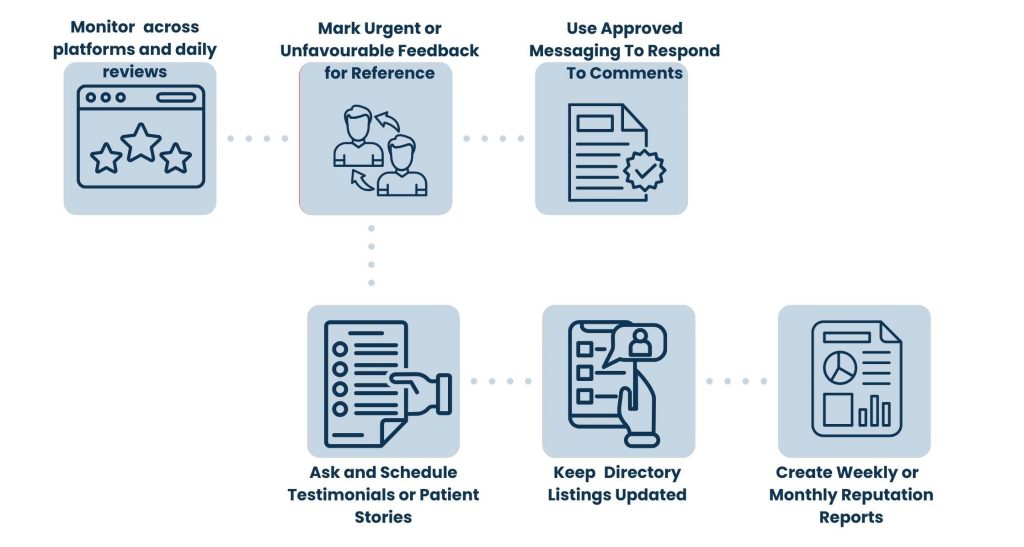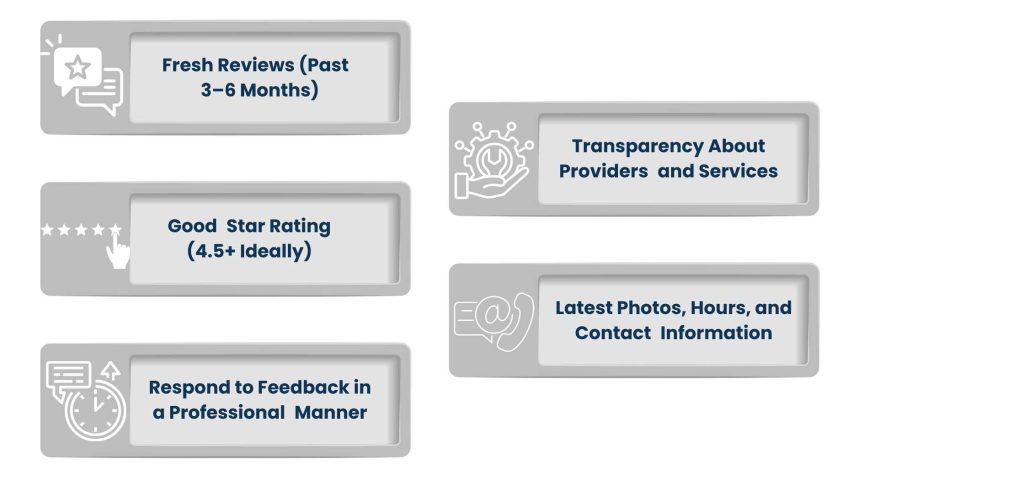Introduction
As a healthcare professional, you already understand that trust is an invaluable asset. But today, trust starts online. From reviews to Google listings, what patients see and read before they ever walk through your door can make or break your practice’s growth. This is why online healthcare reputation management has emerged as a fundamental strategy for thriving medical groups.
The thing is, it’s not just about responding to bad reviews—it’s about creating an online presence that reflects your practice’s commitment to quality care. As practices continue to grow and competition becomes more aggressive, online visibility, consistency, and credibility can influence patient behavior.
In this blog, I’ll guide you through why online healthcare reputation management is so important, how it affects patient trust, and what you can do to proactively shape a reputation that sustains growth.
The Importance of Healthcare Reputation Management
More than 70% of patients read online reviews before making a healthcare appointment. Google, Healthgrades, Zocdoc, and Yelp have taken over as the new word-of-mouth — where one review is enough to undermine a patient’s trust or send them away. For medical practices, managing that online narrative is no longer an option—it is now strategic.
Healthcare reputation management is not just about defending against bad reviews. Its concern is melding a public perception that matches with your values, quality of care, and professionalism. A good, steady reputation does more than improve your visibility — it creates lasting confidence.

Here’s how:
1. Distinguish Yourself in Local Search Results
Search engines give preference to well-reviewed businesses that have consistent information. Receiving more positive and recent reviews will help you rank higher in the Google My Business section of your map results. Once your potential patient finds you, it will be easy for them to choose you over your competitors.
2. Build Trust Ahead Of The Initial Consultation
Patients jump to conclusions about you based on your online reputation. A steady stream of 4- or 5-star reviews conveys reliability, professionalism , and patient satisfaction — building a base of trust before the first interaction.
3. Convert Online Interest into Real Bookings
And even with decent traffic to your site, conversions will lack if your reviews are poor. A good reputation helps patients who may be on the fence feel comfortable moving forward with an appointment.
4. Develop Lifetime Patient Loyalty
When patients see that you value their feedback and respond to it, they will be much more likely to return and recommend your practice to other people as well, creating a good cycle of trust and retention.
How Trust Is Linked To Growth
Trust is the bedrock of every patient relationship in healthcare. However, trust doesn’t begin in the exam room; it starts online. Fostering trust through healthcare reputation management is a win-win for growing medical practices: Better patient retention, more referrals, and healthier growth overall. In an era where impressions are made online, reputation impacts your ability to succeed over time.

This is how trust and reputation drive practice growth:
1. First Impressions Matter
One of the customers’ first encounters with your practice is typically your Google listing or review profile. If your reviews are old, your contact info doesn’t match up, or bad feedback goes unanswered, there is doubt. Even the smallest digital slip-up can impact your trustworthiness. On the other hand, an edifying, optimistic representation signals to potential patients that your care is dependable and professional.
2. Transparency Builds Loyalty
Each positive response and complaint response reflects best practice and the importance of patient voices. This kind of transparency signals accountability and caring that foster emotional trust. Even if a patient had a bad experience, a well-crafted reply can restore confidence and demonstrate that your practice truly wants to make things better.
3. Positive Reputation Fuels Referrals
Trust plays an important role in the way patients recommend you to friends and family or write positive reviews online. That digital word-of-mouth compounds over time — each review reinforcing your online footprint, luring in more patients, and minimizing the need for large marketing expenditures.
Challenges to Grow Procedures
Many growing practices have scaling challenges — new locations, expanding providers, and larger teams. These transitions can result in breakdowns of communication among clinicians and inconsistent experiences for patients, both of which reflect badly online unless resolved.

Here are a few landmines reputation-wise:
- Non-maintained contact information on directories.
- Explosion of patients but no staff to help with complaints.
- Lost Chances to Ask for or Respond to Reviews.
- Bad experiences not paying off on review sites.
- No consolidated tracking of feedback across platforms.
These gaps can snowball without a proactive system in place, undermining well-earned trust and hindering your visibility.
The Benefits of Proactive Healthcare Reputation Management
A great reputation doesn’t come about by chance — it’s the product of deliberate work.

Here’s what happens when you take an active role in managing your online presence:
1. Increased Patient Confidence
When people find hundreds of 4- and 5-star reviews of your care, positive testimonials, and timely responses by your team, they are more comfortable selecting your care.
2. Improved Local SEO
Well-reviewed, consistent listings get priority in Google search results. That translates to improved placement in maps and “near me” searches, which, in turn, drives more bookings.
3. Reduced Patient Churn
Patients are more likely to give your team a second chance, rather than leave negative feedback when they feel heard—even if they had a bad experience.
4. Stronger Practice Culture
Reputation management isn’t only outward-facing. When you share positive patient reviews with your staff, it will lift everyone’s morale and ensure everyone is on the same page regarding your practice.
Ways to Improve Online Healthcare Reputation Management
It’s so vital to growth that if you’re serious about growth, reputation management should be something you do as a matter of course.

A few simple yet powerful actions that you should take:
1. Claim and Update Listings
Claim your practice on Google, Healthgrades, Zocdoc, Vitals, and Yelp. Maintain consistency in hours, addresses, services, and provider names across all platforms.
2. Automate Review Requests
Snag review invites after appointments automatically by using a tool such as Podium, Birdeye, or your EHR system. The less effort involved, the more likely it will be for patients to leave a review.
3. Be Timely and Professional in Your Response
Thank patients for positive reviews. The key to addressing concerns is with empathy, not defensiveness. If you take the time to respond thoughtfully, it shows that your practice is engaged, and eager to learn and improve.
4. Monitor Feedback Regularly
If you have a lot of reviews coming in, assign a virtual assistant or someone on your team to track this weekly. This helps you see patterns, act fast, and celebrate wins together with your team.
5. Use Feedback Internally
If your hospital is not receiving a 5-star review, use patient feedback to find strengths and weaknesses in service delivery. Reviews are also a free advantage-rich insight for ensuring the effort to improve is the result of a complex evolutionary process.
Managing Healthcare Reputation with the help of virtual assistants
Juggling your healthcare reputation management on several platforms can quickly snowball—that’s especially true for growing medical practices with limited in-house bandwidth. Whether it’s responding to a review or just keeping your directory listings updated, your reputation management is something that needs to be done every day consistently, and quickly. That’s where a healthcare reputation management-trained virtual assistant (VA) can be worth their weight in gold.
Since VAs aren’t traditional administrative positions, they’re able to focus 100% of their time on your practice’s virtual home—meaning nothing will fall through the cracks.

With proper systems in place, a VA can blend into your team, taking on tasks like:
1. Monitor across platforms and daily reviews
A VA can monitor all the major review platforms—Google, Yelp, Healthgrades, Zocdoc, and even Facebook—catching feedback in real-time. This means your practice can stay nimble and react appropriately and promptly. This way, your VA can check for new comments every day will not lose any leads or complaints, and will keep your response window tight. Monitoring reviews shows that you care about their experience and build trust in patients.
2. Mark Urgent or Unfavourable Feedback for Reference
Unfortunately, negative reviews can affect a practice’s overall reputation, especially if they are left unattended. A trained VA will also know what reviews need to be acted on right away — like those where medical errors are mentioned, billing disputes, or complaints that have not yet been addressed — and bring those to the attention of the appropriate staff member. A fast fix does more than limit the damage, it often transforms an angry patient into a loyal one. It is impossible to lose a reputation this way; it encourages transparency.
3. Use Approved Messaging To Respond To Comments
You can train virtual assistants to respond to reviews using your practice’s approved tone, voice, and messaging. They can accept compliments graciously and respond to criticism in a calm, constructive way. This branding helps position your practice as responsive, respectful, and trustworthy. Personalized, professional responses convey to prospective patients that your team values feedback and truly desires to provide quality care.
4. Ask and Schedule Testimonials or Patient Stories
Happy patients are typically more than willing to share their experiences — they just need a little encouragement. VAs can send post-visit follow-up messages to patients, ask them for testimonials, and set regular updates for social media and the website. This can foster empathy and trust among potential patients. A properly timed and well-written testimonial says a thousand times more than an ad and proves to potential patients that your care is valued and trusted by others.
5. Keep Directory Listings Updated
Such inconsistent or outdated listings lead to frustration and mistrust. And a VA regularly audits your information on platforms such as Google My Business, Bing, Apple Maps, Healthgrades, etc., and updates them accordingly. Make sure your phone number, address, provider names, and hours are always accurate so that patients can easily find and contact you. “Near me” searches for local SEO are enhanced with accurate listings of all the current data connected to the practice.
6. Create Weekly or Monthly Reputation Reports
Reporting provides you visibility and control. A VA can produce weekly or monthly reputation reports with data such as average star ratings, frequency and response rates to reviews, and common themes drawn from feedback. These reports enable leadership to recognize trends, acknowledge success, and highlight areas for improvement. It transforms subjective reviews into actionable insights—including support to help your team make data-informed decisions that boost patient satisfaction and performance at large.
With the right VA, your reputation doesn’t merely remain unscathed; it becomes an asset for growth. At work, your medical staff is dedicated to delivering care, and your VA makes sure that what patients see online mirrors the professionalism, empathy, and trust you foster within the clinic.
Building a Strong Healthcare Reputation
For example, a new location is opened by a multi-specialty clinic.

They claim their listings, establish an automated review process, and answer all feedback promptly. Within three months:
- Their Google ratings increased from 4.1 to 4.7.
- 18% increase in appointment bookings.
- Referrals through online reviews increase threefold.
- It fixes negative feedback before it gets out of hand.
- Their practice appears in the “Top 5” local search results for medical providers..
This isn’t theory; this is what effective reputation management brings for growth-oriented medical practices.
What Patients Want to See Online
To gain trust in a competitive healthcare environment, your online presence has to match the level of care and professionalism that you provide within your practice. Patients are no longer simply assessing your medical qualifications — they’re also judging your digital reputation. What they find online establishes the tone before they’ve even crossed the threshold.

Here’s why patients are searching your practice online and what they seek:
1. Fresh Reviews (Past 3–6 Months)
New reviews indicate that your practice is active, consistent, and relevant. If all your reviews are old, prospective patients may conclude you’re not monitoring your reputation closely, or worse, that your level of care has dropped. Ongoing, real-time feedback helps build trust and shows continuous patient satisfaction.
2. Good Star Rating (4.5+ Ideally)
Star ratings are frequently the first thing a patient sees. No need to be perfect, but getting 4.5 to 5-star ratings puts you on the map as top-rated for that area. Even when you get some bad reviews, a high overall average strengthens your credibility.
3. Respond to Feedback in a Professional Manner
Patients want to know how your team responds to feedback — especially if it’s negative. Timely, compassionate responses communicate that you care about communication and care about addressing issues.” This builds trust with existing users as well as potential users.
4. Transparency About Providers and Services
Patients want to know who will be treating them and what to expect. Including detailed bios about providers, areas of expertise, accepted insurance plans, and descriptions of services helps to set realistic expectations and reduce anxiety before the first visit.
5. Latest Photos, Hours, and Contact Information
Simple details like correct office hours and clean, professional images of your staff and facility make all the difference in first impressions. Stale or incomplete information can confuse patients — or worse, suggest a lack of attention to detail.
Conclusion
In the patient-centered landscape of today, healthcare reputation management isn’t optional or the cherry on top of the cake — it’s the entire cake. It’s the growing medical practices that understand the importance of cultivating and safeguarding their healthcare reputation management that succeeds. It’s not just about good PR. It provides a reputable, responsive, and consistent experience that converts one-time patients into lifelong advocates.
With the right systems in place, and the right tools (and people) to help — such as a trained virtual assistant — you can stay ahead of this feedback, maintain control of your brand on the web, and continue to grow in confidence.
We at Tasks Expert offer professional online presence management for growing medical practices. Our virtual assistants are trained in review monitoring, reputation tools, and healthcare communication so you can focus on delivering excellent care while we manage what the world sees online.
About Us
Tasks Expert offers top-tier virtual assistant services from highly skilled professionals based in India. Our VAs handle a wide range of tasks, from part time personal assistant to specialized services like remote it support services, professional bookkeeping service etc. Furthermore, it helps businesses worldwide streamline operations and boost productivity.
Ready to elevate your business? Book a Call and let Tasks Expert take care of the rest.










